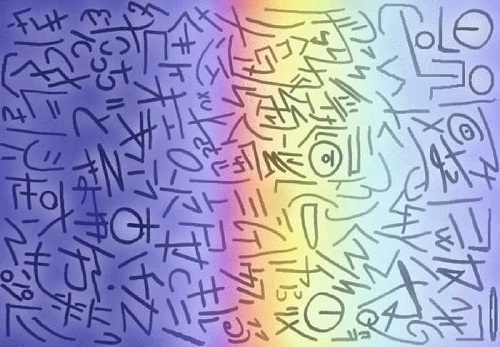FWP:
SETS == POETRY
SPEAKING: {14,4}
Ghalib's critics famously complained that his verse was incomprehensible. Hali observes that 'Mirza has here and there, in his Urdu and Persian divans, alluded to this kind of nit-picking'; as examples, he cites the present verse and {175,6} (Yadgar-e Ghalib, p. 112). Azad echoes these complaints (pp. 494-97, Ab-e hayat). I've discussed the alleged incomprehensibility of his poetry in an article.
Another comment on the subject by Ghalib takes the form of a very famous quatrain (Hamid 218, Arshi 339; also in Sarvar, p. 120):
mushkil hai zabas kalaam meraa ai dil
sun sun ke use su;xanvaraan-e kaamil
aasaa;N kahne kii karte hai;N farmaayish
'goyam mushkil va-gar-nah goyam mushkil'
[my poetry is quite sufficiently difficult, oh heart
repeatedly hearing it, accomplished poets
request me to speak/compose easy [verses]--
'If I speak/compose, it's difficult; and if I don't speak/compose, it's difficult'
'I speak/compose the difficult; otherwise, I speak/compose with difficulty']
The fourth line, in Persian, is framed with an uncapturably clever twist; its double translation reflects two ways of reading va-gar-nah (as either 'and if not' or 'otherwise'). Needless to say, in speaking about his difficult poetry Ghalib was also speaking about it in a difficult way.
In its scope the present verse could apply to all the speaker's speech, since merii baat , my 'idea' or 'words' or 'utterance', is not a concept limited to poetry. And it certainly works that way as a witty or desperate observation by the lover on the inexpressibly dire straits in which he finds himself. But Hali's observation is plausible, and it's certainly easy to imagine this verse as a wry reaction to a group of particularly obtuse and uncomprehending critics.
As a final elegant touch, both ;haal and mu;haal come from the three-letter Arabic root ;haul , 'to become altered or changed'.

Hali:
That is, if in silence is the advantage that the state of the heart does not become manifest, then I am happy that my speech too gives the benefit of silence itself; because my speech/poetry [kalaam] isn't understood by anybody. (112-13)
==Urdu text: Yadgar-e Ghalib, pp. 112-13
[See also his comments on {175,6}.]